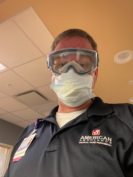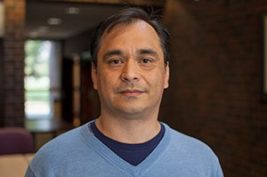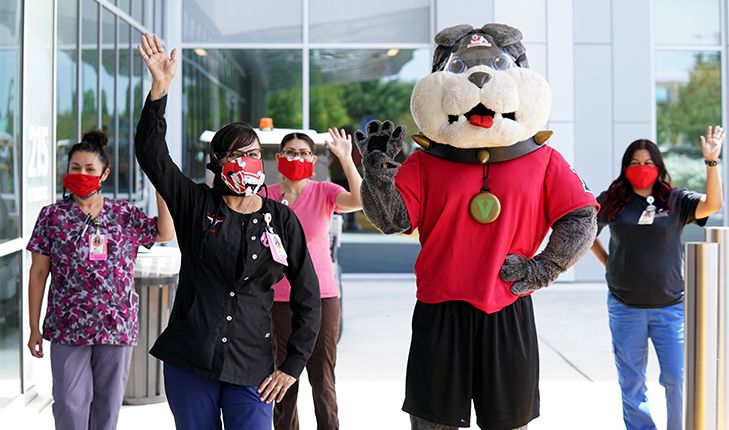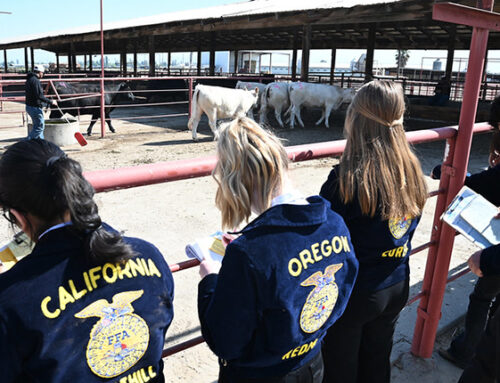 Fresno paramedic Travis McSherry knelt over a man wearing pajamas and lying on the floor of his bathroom. The man — who spoke Spanish — had fallen in the night after becoming dizzy and suffering chest pains.
Fresno paramedic Travis McSherry knelt over a man wearing pajamas and lying on the floor of his bathroom. The man — who spoke Spanish — had fallen in the night after becoming dizzy and suffering chest pains.
McSherry is not fluent in Spanish, but he understood enough to exchange vital information with his patient. That was possible thanks to a language class offered through the Division of Continuing and Global Education during the coronavirus pandemic.
“Because of the Spanish class, I understood why the man had fallen, and I put him on a cardiac monitor and started an IV as opposed to just worrying about his head injury,” McSherry says. “And once we got him to the hospital, I was able to steer his care in a better direction.”
The Division of Continuing and Global Education offered Functional Spanish for Emergency Medical Responders — and two other classes — for free. All three short courses were conducted online, with total instruction time ranging from eight to 20 hours over several weeks.
Fresno State joined other campuses in the California State University system in a coordinated effort to serve first responders and other essential workers as the pandemic upended normal life and sent millions into lockdown.
“Our dean [Dr. Scott Moore] felt we could provide something for essential workers,” says Susan Hawksworth, a program and marketing specialist in the Division of Continuing and Global Education. “It’s what we’re all about, finding a need we can fill and providing an educational opportunity to someone who’s not a traditional college student.”
The other two courses offered for Essential Workers were Online Teaching: From Surviving to Thriving and Project Management for the Workplace. Instructors from Fresno taught all three courses.
“I’m really proud we were able to teach with our local talent,” says Daniel Bernard, associate dean in the Division of Continuing and Global Education.
Instructors were eager to participate. “We felt the Spanish course would benefit the community in so many ways,” says Dr. Jaydene Elvin, assistant professor of linguistics at Fresno State. “We really focused on language that emergency medical responders would need to communicate with patients at the scene.” Elvin developed the course with Cheryl Chan through the University’s newly-established Hub for Language Teaching and Learning.
The Online Teaching: From Surviving to Thriving was a timely subject to offer.
“Instruction around the world had to swiftly move online due to COVID-19, which left many gaps for students and instructors alike,” says Lejla Tricic, who taught the course. She is a lecturer in the English Department and serves as aquality assurance training facilitator on campus. The curriculum covered course design, time management strategies, and other related subjects.
“In my opinion, digital learning is here to stay, and there is no going back,” Tricic says.
 Paul Sanchez, an adjunct instructor at Fresno City College, took Tricic’s course because he agrees with her assessment: online instruction will only grow in importance. Sanchez who teaches English provided an example of what he learned. “For a lot of us, literature helps us to understand ourselves and have more compassion and empathy while giving us hope. The class helped me understand there are teaching principles to communicate that in an online class.”
Paul Sanchez, an adjunct instructor at Fresno City College, took Tricic’s course because he agrees with her assessment: online instruction will only grow in importance. Sanchez who teaches English provided an example of what he learned. “For a lot of us, literature helps us to understand ourselves and have more compassion and empathy while giving us hope. The class helped me understand there are teaching principles to communicate that in an online class.”
The course not only addressed immediate needs but can benefit more teachers in the future, Sanchez says: “When I’m in other trainings, I can share the information with others.”
Meanwhile, the Project Management for the Workplace course attracted people from professions as varied as the military, manufacturing and medicine. Olustee Steve Smith, a safety and training officer with the City of Fresno, taught the class. Unlike the Spanish and online teaching courses — which were new offerings — Project Management was taught before the pandemic. Some of the topics covered were the phases of a project — initiation, planning, execution, monitoring and closing — as well as risk management.
“I was considered ‘essential’ so I could relate to my students, and I wanted to help them out,” Smith says. “It was great the class was offered to essential workers to show appreciation to them during the pandemic.”
Robert Goddard — a civilian employee of the U.S. Navy at Lemoore Naval Air Station — took the course. His job in public works involves him with Navy personnel as well as senior managers and construction workers in civilian organizations.
“Mr. Smith did a good job of covering the importance of communicating effectively,” Goddard says. “That’s important from the beginning of a project and is the key to success.”
Goddard — a graduate of Fresno State whose daughter is a current student — says he’s proud the University offered thecourse during the pandemic. “It’s great that Fresno State was thinking of the community as a whole.”
McSherry, the paramedic, shares that sentiment. As he helped the man on the bathroom floor, their ability to communicate reassured the patient. “That helped the whole process,” McSherry says.
He also could reassure the man’s wife, who was stressed by her husband’s collapse. “I was able to let her know I knew a little Spanish, and it would help if she talked a little slower. I was able to give her a bit of reassurance that I was there to help.”
(Story by Douglas Hoagland, a freelance writer based in Fresno)




